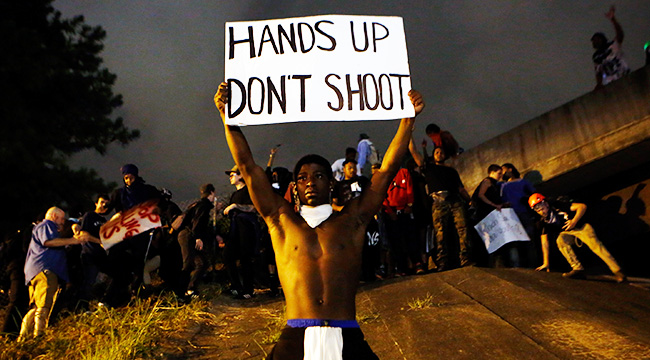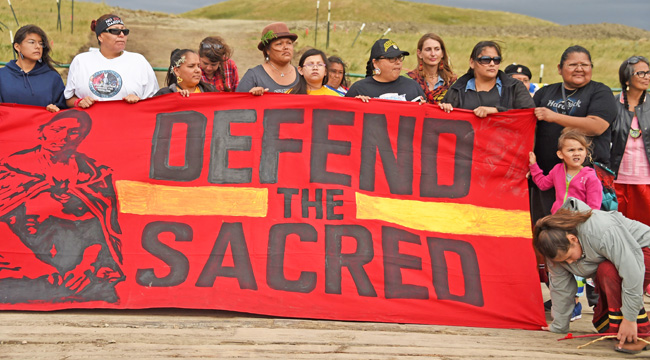
Hating on 2016 — the year that stole some of our most rebellious icons, the year that brought us fake news and president-elect Tweet storms, the year that even tried to ruin the joy of eating raw cooking dough — has become a treasured internet pastime. There is no more popular rallying cry at this particular moment in history than to scream into the void about your loathing for the year that was.
We get it, trust us we get it. Loss of beloved heroes not withstanding, there are legitimate metrics to indicate that 2016 was a genuinely bad year in the grander scheme of things. We saw an increase in hate crimes towards Muslims and the LGBTQ community, a spike in terrorism, and our election was tampered with by a hostile foreign government. Plus Zika and Brexit and Flint and…
But there is a silver lining (however faint), one which no year since 1967 has highlighted so clearly: In 2016 we were reminded of the power of protest.
The significance of this can’t be overstated. Throughout this contentious year, we witnessed, many times over, how peaceful opposition makes an impact. When your president-elect loses the popular vote by the largest margin in history, when governments make laws that public sentiment clearly trends against, when corporate interests seem to wield incomprehensible power, it’s easy to feel voiceless. Protest was our counterpoint.
This sort of dissent fits into a long tradition. It’s one of the most historically patriotic things a citizen can do. As American as apple pie. The protesters of 2016 stand beside Martin Luther King Jr., Rosa Parks, Susan B. Anthony, and our founding fathers. We’re a nation that pushes forward through marches, sit-ins, and rallies, and 2016 underscored that fact. (It’s fitting that Stonewall was named a National Monument in June, even as the fight for LGBTQ equality continues.)
The year illustrated, with breathtaking clarity, Margaret Mead’s famous saying:
Never doubt that a small group of thoughtful, committed citizens can change the world; indeed, it’s the only thing that ever has.
Just look at how a very small group of people stopped a multi-national corporation in North Dakota. No skeptic on earth could say that their protest wasn’t powerful. It drew eyes from around the world while sparking conversation over Native American issues that had been woefully lacking during the election cycle. Or consider the continued rallies over police violence led by Black Lives Matter, which have prompted demonstrable changes in policy and ushered in a new generation of political leaders. As 2017 begins, our country is finally having more honest, progressive discussions of race — protest threw open that door.

The argument against protests is always the same, uttered by skeptics and scoffing members of the establishment, “It ultimately changes nothing. Everyone will move onto something else in a week.” To anyone treating protests as if they exist in a vacuum, the “it changes nothing” argument probably seems highly logical. But it’s actually antithetical to logic, because nothing happens in a vacuum, especially not protests.
All year, our rallies and marches led to publicity which led to conversation which led to further protests, further conversation, and further publicity. The cycle continued and the messages evolved, mostly thanks to the fact that 2016’s conscientious dissenters were rock solid in their convictions — whether it was Colin Kaepernick continuing to take a knee during the anthem even as people accused him of being a “distraction,” or the #NODAPL protesters fighting North Dakota’s ferocious winters. Eventually, these conversations began taking place on a national level, so that the President of the United States felt the need to make his feelings known.
We can see the wider effects of protest with regards to the election too. Railing against a foregone conclusion felt, to many, to be absurd. But it’s impossible to ignore how marches across the country — many led by teenagers — served as a call to action for both the media and the government. It was a warning to our new regime: We are watching, we demand progress, we will not look the other way.
The year even gave us a memorable Twitter protest in #OscarsSoWhite. The hashtag and ensuing dialogue allowed us to drill down to the root of the issue. Tweets, so often scoffed at for being ineffective, actually prompted far more than 140 characters-worth of introspection. Again, these protests don’t have to be an ends unto themselves — they are part of a bigger system and their efficacy deserves to be measured on a long timeline.
Sure, 2016 was rough. We lost icons and renegades of the highest order. But we gained new leaders too and were reminded of a vital part of our national identity. We are a people who take to the streets, we are a nation of raised fists and painted signs, we are the land of dissent. We’d be wise to remember these truths as the new year begins.






